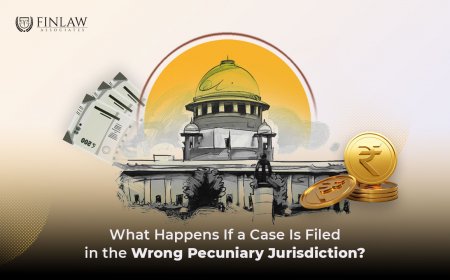Understanding the Whistleblower Protection Act 2014 in India: Key Provisions and Objectives
The Whistleblower Protection Act 2014 offers legal protection to individuals revealing corruption and unethical practices in India, ensuring their safety and privacy.

The Whistleblower Protection Act of 2014 is a critical piece of law in India that tries to offer a safeguard for those who disclose corruption, wrongdoing, or illegal actions within government bodies, public institutions, or private businesses. The Act was presented to address rising concerns about whistleblowers' safety and rights, since they frequently risk reprisal, harassment, or professional penalties for disclosing unethical actions.
Prior to the passage of this legislation, whistleblowers had minimal legal protection, discouraging many from disclosing crucial information about corruption, fraud, and other criminal activity. The absence of protections resulted in a culture of impunity and lack of accountability, which the Act seeks to address. The Whistleblower Protection Act of 2014 allows individuals to expose wrongdoing while keeping their name anonymous and shielding them from reprisal, such as job termination, harassment, or discrimination.
This law is a key instrument for increasing openness and accountability in both the public and private sectors. By giving whistleblowers legal certainty that their safety would be safeguarded, the Act encourages more individuals to come forward and expose corruption or other malpractices, ensuring that wrongdoing is adequately investigated and dealt with. It offers a process for investigating charges of corruption and other types of misbehavior, so contributing to a more ethical and transparent environment in public administration and corporate governance.
In essence, the Whistleblower Protection Act of 2014 contributes significantly to India's efforts to improve governance, ethical practices, and combat corruption by giving individuals the confidence and protection they need to report illegal activities and protect the public interest.
What is the Whistleblower Protection Act, 2014?
The Whistleblower Protection Act, 2014 is a key piece of law passed in India to protect persons who report corruption, misconduct, or other wrongdoing inside government agencies, public institutions, or commercial businesses. The Act's principal goal is to provide a legal framework that assures whistleblowers' safety, secrecy, and protection against retribution or discrimination, encouraging people to reveal unethical or unlawful actions without fear of personal, professional, or bodily damage.
Overview of the Act's Purpose: Protecting Individuals Exposing Corruption and Wrongdoing
The primary goal of the Whistleblower Protection Act is to protect persons who come forward to disclose acts of corruption, fraud, unlawful activities, or other types of wrongdoing within companies without fear of reprisal or retaliation. Prior to the passage of this law, those who sought to report such events frequently suffered job loss, harassment, social ostracism, or even threats to their personal safety. The Act tackles these concerns through:
Protecting Whistleblowers: It establishes legal measures to avoid retribution, ensuring that whistleblowers are not discriminated against, dismissed, or harmed for sharing information about illegal activity.
Ensuring Confidentiality: The Act protects the whistleblower's anonymity and identity throughout the inquiry process.
Promoting Accountability: By allowing anyone to report corruption or other malpractices, the Act promotes openness, accountability, and integrity in both public and private organizations.
Creating a Formal Reporting Mechanism: It creates a clear and structured mechanism for reporting wrongdoing to authorities, such as the Central Vigilance Commission (CVC), ensuring that complaints are thoroughly investigated and resolved.
Historical Background and Why the Whistleblower Protection Act, 2014 Was Introduced
The Whistleblower Protection Act of 2014 was enacted in India to address the rising need to protect persons who disclose corruption, wrongdoing, or unlawful activity, particularly inside government institutions and commercial enterprises. Prior to this Act, whistleblowers frequently suffered severe reprisal, including harassment, job loss, and even threats to their lives. A notable example is the tragic story of Satyendra Dubey, an NHAI engineer who was assassinated in 2003 for exposing corruption in a highway project. This incident revealed the absence of protection for whistleblowers, prompting public demand for tougher safeguards.
The Law Commission of India and civil society organizations have long advocated for such a law, and there was growing pressure on India to line with global standards, since several nations had already passed whistleblower protection legislation. Additionally, the Supreme Court and numerous committees asked the government to offer legal protection to persons who disclose wrongdoing. In response to these requests, the Whistleblower Protection Act of 2014 was enacted to provide a legislative framework that would safeguard whistleblowers' safety and anonymity while encouraging openness and accountability in both the public and commercial sectors.
Key Provisions and Objectives of the Act
Protection Mechanisms for Whistleblowers: The Act protects whistleblowers against retribution, including dismissal, harassment, and threats. It ensures secrecy to protect their identity.
Definition of "Public Interest Disclosure": The Act defines "public interest disclosure" as a complaint made by an individual regarding corruption, abuse of authority, or any illegal behavior within public positions that is harmful to the public welfare.
Authorities Responsible for Handling Whistleblower Complaints: The Central Vigilance Commission (CVC) or other approved bodies are in charge of accepting and investigating whistleblower allegations. They are responsible for ensuring that complaints are addressed properly and swiftly.
Penalties for False Complaints or Disclosures: The Act punishes people who file false or malicious complaints. These sanctions are intended to deter abuse of the reporting process.
Penalties for False Complaints or Disclosures: The Act punishes people who file false or malicious complaints. These sanctions are intended to deter abuse of the reporting process.
Who is Protected Under the Whistleblower Protection Act of 2014 in India?
Individuals Eligible for Protection: Protection is available to both public and private individuals, including government employees, public servants, and private sector personnel. Whistleblowers may also be civilians who disclose corruption or malfeasance.
Types of Disclosures Covered:The Act covers disclosures including corruption, misuse of public office, unlawful actions, and abuse of authority in government and private enterprises.
Exceptions: The Act's protections do not extend to disclosures that are false, malicious, or done for personal advantage. It also does not encompass disclosures on things that are not of public interest.
How to File a Complaint Under the Whistleblower Protection Act in India?
Step-by-Step Guide to Filing a Complaint
Step 1: The whistleblower must file a formal complaint or public interest disclosure with the appropriate authorities (e.g., CVC).
Step 2: Evidence must be provided to back up the disclosure and demonstrate the claimed misconduct.
Step 3: To avoid reprisal, the whistleblower must keep their name private.
Rights and Responsibilities of Whistleblowers
-
Whistleblowers have the right to remain anonymous and be protected from reprisal.
-
They are accountable for providing accurate information and following the appropriate procedure for registering complaints.
Challenges and Limitations of the Act
While the Whistleblower Protection Act of 2014 is an essential step toward encouraging openness, its implementation faces many hurdles.
-
Delays in implementation: Bureaucratic red tape and a lack of resources frequently cause delays in Act-related investigations. Institutions in charge of addressing complaints, such as the Central Vigilance Commission (CVC), frequently experience manpower shortages, slowing down the process. Furthermore, the delayed court system causes delays in remedies, deterring future whistleblowers.
-
Lack of awareness: Many prospective whistleblowers are uninformed of their legal rights or how to register a complaint. There has been little outreach and education, particularly at the grassroots level, preventing people from fully utilizing the Act. The filing process can sometimes be complicated, causing hesitancy among people who worry their complaint will not be taken seriously.
-
Insufficient protection: Despite the Act's safeguards, whistleblowers continue to endure reprisal, including job loss, harassment, and even threats to their safety. Enforcement of protective measures is variable, and in certain circumstances, retribution goes unchecked. The Act lacks comprehensive witness protection measures and does not adequately address the psychological impact on whistleblowers, preventing them from coming forward.
Future of Whistleblower Protection in India
The Whistleblower Protection Act of 2014 is an important step forward in combating corruption and increasing openness in India. However, in order to ensure its long-term usefulness and influence, it must be improved and adapted continuously. The future of whistleblower protection in India may see many advancements aimed at improving the Act's functionality, reaching more people, and providing greater safeguards for those who disclose misbehavior.
-
Proposed Amendments: One of the primary areas where the Whistleblower Protection Act might be strengthened is through the introduction of changes to remedy holes in its implementation.
-
Clearer procedures and Procedures: One issue with the present Act is the absence of clear and uniform procedures for dealing with complaints. The Act might be made more effective by simplifying the complaint procedure and establishing precise time periods for inquiry and resolution. Clearer standards for confidentiality, managing sensitive material, and investigating complaints would boost whistleblowers' confidence in the system.
-
More Stringent Penalties for Retaliation: Despite current rules, retaliation against whistleblowers remains a major issue. Strengthening the consequences for individuals found guilty of retaliation may help curb wrongdoing. Individuals or groups who threaten, harass, or damage whistleblowers in any way may face severe repercussions. Furthermore, implementing specialized retaliatory measures in the private sector may give greater protection across all sectors.
-
Widening the Scope of Protection: Amendments might potentially widen the Act's scope to include other sorts of disclosures, such as those involving corporate governance, environmental infractions, and human rights abuses. Expanding the scope would assist to address growing challenges and promote reporting on a broader variety of unethical acts that harm public welfare.
-
Comprehensive Witness Protection: Currently, the Act does not include provisions for a full-fledged witness protection scheme. Creating an official protection framework to secure the safety and anonymity of whistleblowers, particularly in high-risk situations, would help the law's implementation. This might include providing physical protection, psychological assistance, or even relocation services if needed.
-
Promoting Transparency: For the Whistleblower Protection Act to be fully effective, it must focus on promoting a culture of openness and accountability in both the public and private sectors. This includes fostering a climate in which people feel comfortable reporting wrongdoing and are certain that their concerns will be handled seriously.
The Whistleblower Protection Act, 2014 is a step forward in encouraging accountability and openness in India. However, in order to optimize its impact, ongoing changes and cultural transformations must occur. Proposed improvements to the Act, such as clearer rules, harsher punishments, and extensive witness protection, would serve to close existing gaps and strengthen enforcement. Furthermore, developing a culture of openness via education, safe reporting mechanisms, ethical leadership, and independent monitoring would allow citizens to speak up and expose injustice without fear. With these improvements, the Act might play a critical role in establishing a more transparent, responsible, and corruption-free India.
What's Your Reaction?















